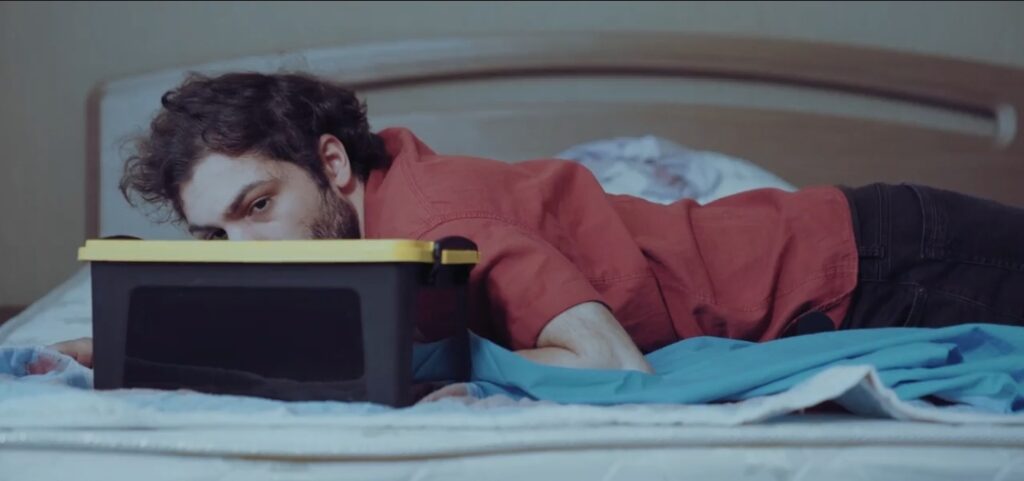Nikoloz Gabunia's student film "For the Motherland and Stalin" (2019) describes the events unfolded during one day, where the key figure is the main character, grandfather’s foot. It is a kind of attribute for the director to juxtapose two worlds, World War II era and modern Georgia or society. The film does not teach any moralistic, “smart” lessons. Nikoloz Gabunia simply reflects the events, chooses neutrality, does not favor any side, does not try to romanticize anything or offend anyone. He only tells stories.
The grandfather whose leg is being amputated is a World War II veteran, and it is most likely a wartime wound that caused his leg to be amputated. His wish is to bury his foot next to his wife's grave and his grandson is tasked with fulfilling his will.
Giga Datiashvili's character is a young man. The audience does not have much information about him. The director creates the main character’s by showing only small details. It's true that we don't know exactly who this character is, what his name is, what he does, etc., but we have an idea about him. He lives with his parents, probably at their expense (he asks his father for money while talking on the phone), he takes drugs, goes to night clubs, sleeps late.
"For the Motherland and Stalin" is a genre film. At such times, it is difficult for a novice director to keep pace. The story needs to be more alive. Although the film is only 16 minutes long and there is not much action in it, the story does not develop at all, no conflict emerges. The only thing the "disappearance" of the drug dealer is more or less intriguing. However, it does not bring tension and appears more like an artificial conflict.
The slow rhythm and the monotony of the story create emotionlessness in the audience. However, the presented situation, walking around the city with grandfather's foot, provides an opportunity to create interesting and contextually acceptable episodes. The director couldn't put many such scenes in a short film, but a few quality episodes would have been enough to create mood. It doesn't really matter what this character would be - dramatic, tense, comical... it would create any acceptable and logical mood.
One of the sources of emotionlessness in the film is the work of the camera. "The camera should make you feel that the film is alive" - this is not the case in Nikoloz Gabunia’s film. The shots are static, there are almost no portraits, the close-ups are mostly long and medium views. The scene of the friends waiting is also dragged and meaningless, although Giorgi Mikeladze made several shots attractively. Scenes in the entrance of the building, columns and arches create a visual image, but it does not affect the final look of the film. The episode of searching for drugs at night with flashlights is not superfluous in the film, but it is shot in poor quality.

The stillness of the camera and the distance from the action and characters may be the style the director is looking for. Through work and practice, he might really develop his style. On the other hand, Nikoloz Gabunia may have avoided loading the camera, so as not to make any mistakes in the movement. In addition, the change of angle and distance during the movement of the camera should be considered and calculated and it is thought that he avoided this difficulty as well. However, the choice he made did not work out. It made the movie mediocre and lost the sense of pace. Moreover, the dialogues and actions are less powerful and energyless.
One of the weak points of the film is the sound. The sounds are not cleaned, the external noise in the exterior scenes covers the dialogues. The sound of the street and the wind comes harshly into the film and the viewer has to strain to make out the words in some cases.
Dialogues seem artificial. In order to get something to say, the characters pause or, suddenly, illogically start talking about a particular topic. For example: "Whose concert is it?" Is 2Pac playing?” Why the director inserted this scene is a question. Obviously too much for the movie. If it wanted to show something or express the characters’ personality, it didn't work because it is artificially staged. One of the main reasons for this artificiality is the actors and their performance. Neither speech nor action showed naturalness. One can only more or less distinguish the main character, who really creates the type.
"For the Motherland and Stalin" is a film that shows young people’s attitude towards specific topics, what their priority is, what is valuable and important to them. At the end of the film, the guys sitting in the bar are cynically drinking a toast with drugs: "To homeland! to Stalin!" and next to them, on the table, there is the foot of the man who fought for this idea. The struggle of youth is manifested in something else. It is more of a struggle for oneself, for one's own pleasure, and a leg injured in war is simply an extra burden.
Nikoloz Gabunia's idea and cynical messages are a new approach to a similar topic. This film, as an idea, is interesting, but it has flaws in its implementation, by correcting which, a significant result could be achieved. Especially if the director kept the balance and rejected all pathos.
Gvantsa Nozadze






